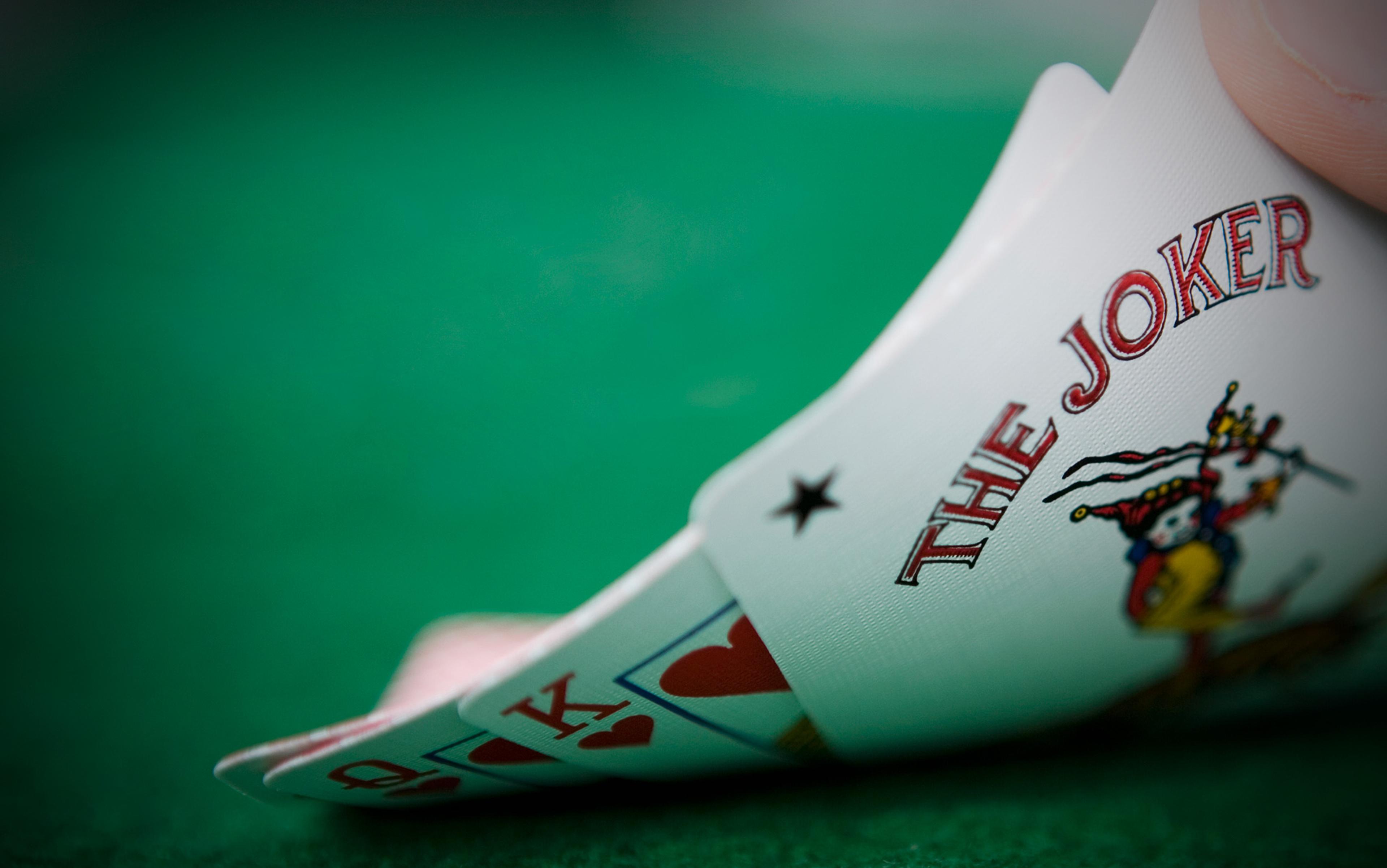Relationships are hard. So is poker. The analogy is well-documented in song lyrics: think of Amy Winehouse’s ‘Love is a Losing Game’ (2006): ‘Over futile odds, and laughed at by the gods’; or Ray Charles’s ‘Losing Hand’ (1953): ‘I gambled on your love baby, and got a losing hand.’ But losing is not the only point of comparison, so if you love love and want to be a better better, then read on.
Let’s begin with the basic (simplified) rules for Texas Hold’em-style poker: each player gets two cards. The aim is to combine those two cards with the ‘community’ cards that get presented on the table (the first three are called the ‘flop’, then the fourth is the ‘turn’, and the fifth is the ‘river’) to create the highest-scoring ‘hand’ (a combination of five cards). Players bet on their having the highest scoring hand using ‘chips’ that have a monetary value. The rankings of the hands, starting with the highest, are: Royal Flush (A, K, Q, J, 10, all of the same suit); Straight Flush (five cards in a sequence, all of the same suit); Four of a Kind (four cards of the same number/picture); Full House (three of a kind and a pair); Flush (five cards of the same suit, but not in a sequence); Straight (five cards in a sequence, but not of the same suit); Three of a Kind (three cards of the same number/picture); Two Pair (two different pairs); Pair (two cards of the same number/picture); High Card (in the absence of any other ranking, the person with the highest number/picture card wins).
At the start of each game, one player (on rotation per game) must make a ‘blind’ minimum bet. The other players then make a choice – those who want to play also make (at least) a blind bet. Once the blinds are made, the three cards of the flop are presented. Then, and at each addition to the community cards thereafter, a round of betting commences, starting with the player who made the blind. The betting options are as follows: (i) to ‘see’ the previous bet by matching it; (ii) to ‘raise’ the previous bet by increasing it – if you increase it with all of your remaining chips, you’ve gone ‘all in’; (iii) to not bet and thereby ‘check’ when no raise was previously made by other players and all blinds are seen; (iv) to ‘fold’ and thus pull out of the game, losing your betted chips. Without chips, you cannot bet. If you fold, you cannot win. If all players apart from one player folds, that remaining player wins the chips. Otherwise, after the river, the remaining players compare hands to see who has the highest ranking to win the chips.
Now imagine that you are playing poker with only one other person. Imagine the two cards you get dealt resemble this other person, and their two cards resemble you (a bit like on the dating app Tinder, where you have your own personal ‘card’ that resembles you – basically, your profile – which is included in the deck of all other budding daters for others to swipe over). Imagine the game itself resembles the relationship between the two of you. Imagine that bets are like moves – something that you do to pursue the other, or some effort that you make for the other, or some act that you do to take things to the next stage in the relationship, in a way that utilises your resources (just as chips resemble your monetary resources). Imagine the community cards resemble situations in your life, where each addition is like a new event. Imagine the community cards can be added to without limit, going way beyond the river, with betting after each addition, for as long as the players bet/check accordingly.
The set-up is now complete, and you are ready to play! First things first, how do you judge your cards before the flop? And how do you judge a person at first sight? Potential might be lacking – eg, a 2 and a 6 of different suits, the equivalent of a seemingly boring person. But of course, things are not always as they seem, especially when taken out of context. After all, the community cards might come to include a 3, a 4 and a 5, which gives you a Straight, which would be the equivalent of digging deeper to find an exceptionally interesting person underneath their boring veneer. In other words, perhaps your prospective partner seems not to have much going for them, but then they might work well with the situation that is about to be laid out before you, as different people are good for different situations. Basically, low expectations can be exceeded.
Yet on the other hand (pun intended), high expectations can sometimes not be met. Potential might be high – eg, a perfect pair of pocket Aces, the equivalent of someone that ticks all your boxes. But again, their value is relative to what comes up in the community cards or in life, and they simply might not fare well with what it delivers. The overall point here is that first impressions can be deceiving, and the value of such things are, to a certain extent, circumstantial and context-dependent. We can’t know much right away, so let’s find out. Let’s make a move and bet.
Someone has to make the first move, the blind bet, the leap of faith, to start the game/relationship going. Making or seeing that blind bet gives your cards/person a chance, and you embark on the game/relationship for now to see what the flop/life throws at you (the equivalent of swiping right on Tinder – do this too much, and the result is lots of ill-fitting ‘matches’). Or perhaps you reflect on your minimal resources and take one look at the cards/person in despair, and immediately fold (the equivalent of swiping left – do this too much and the result is lots of missed opportunity).
Or perhaps you are feeling abundant and get excited to be dealt a King or a Queen, and so raise the bet. Once the blinds are made, there is the option of checking from thereon. You might do this if you don’t want to present yourself as being either put off or keener as a result of how things have gone so far – keeping your cards close to your chest, so to speak. Obviously, checking is not an option if the other player made a bet. Unfortunately, you can’t bring their bet down. Once their move is made, if you want to stay in the game, then you have to react in a way that doesn’t negate or erase their move. The stakes have been raised, and you have to be their equal in order to continue playing. And if you don’t want to continue playing, you fold. (Although sometimes folding is easier said than done, or in the worst of situations can be made impossible, where your bets are coerced and your chips are stolen from you.)
But ordinarily, when playing by the rules, there are always the aforementioned ways to respond to someone else’s bet: seeing, raising or folding. Each time another community card comes around, the situation changes, and there is the opportunity to reassess what it means to you and whether you want to continue to pursue it. Seeing their bet shows that you want to continue in the game/relationship, which is the minimum you can do to keep things going. Raising their bet is giving more of what you’ve got, perhaps to see if they want it. You can raise full hog by going all in, which signals that this is now all or nothing for you, as you are putting all your eggs into this one basket. Or you can fold and leave – maybe it was too much for you and you didn’t have similar resources to put in or, even if you did, it wasn’t worth it for you because you didn’t value what you had. (Notice the somewhat comforting dis-analogy that if someone folds on you, you technically ‘win’ by getting to keep all of what they put in!)
What about bluffing? That is, putting on some sort of act for the other players to read. Firstly, it is important to note that players might not be reading each other correctly if they have only just started their game and don’t know each other that well. So, a player can be misled by the actions of the other, without the other player intending to mislead. Here, the player is accidentally being bluffed. It takes time to really get to know how another person plays and what their moves really mean. Secondly, a player might not be very experienced and thus might not recognise the value of what they’ve got in their hands, and make moves that are unintentionally misleading. Here, the player is accidentally being a bluffer. Thus, sometimes we are wrong about the other person by misjudging their value (being a bluffer) or misreading their moves (being bluffed) that might not have been intentional.
Bluffing could be a weird tactic to get out of the relationship by scaring off the other person
But poker is often pitched as a game of manipulation, where bluffing is intentional in order to deceive, so as to try to win the chips regardless of whether your hand is the highest ranking. As such, one of the main strategies is for the other players not to be able to read you accurately, and to pick up only on the messages you intend for them to pick up on. This doesn’t translate so well into relationships, as good relationships are more co-operative than competitive. Yet, we never really know what things are like for the other person in the relationship, and we don’t have all the information about them (including the motivations behind their actions and how much they value you) beyond what they say/show is the case.
So, suppose you play ‘open hand’, where you can see each other’s cards (or, on the relationship analogy, being completely open and honest about the value you give the partner/relationship). That way, you can see how valuable their hand is with relation to the community cards. Nothing you can do can really alter that, as it is dependent upon what the community cards show up, and how that player interprets their cards’ value relative to it. Note though that this allows for some mismatch between the perceived value of the cards to each player – one player could see value in their cards and the other might not, perhaps due to different levels of experience or optimism about what the community cards might be. To some extent then, you cannot alter how valuable you or the relationship is to the other person – you can’t change their feelings or make yourself fit into a certain situation that doesn’t work. But what you can do is attempt to influence the other in certain ways, which is more akin to intentional bluffing.
There are many ways to intentionally bluff, but here are the two simplest: (i) pretending to have a high-scoring hand when you don’t; or (ii) pretending to have a low-scoring hand when you don’t. In the first case, presumably the purpose of the bluff is to make the other player think that they will lose against you, and eventually fold, leaving their chips to you. In the second case, presumably the purpose of the bluff is to make the other player think that they will win against you when actually you have a better hand, which will see you through to the end whereupon your cards will trump theirs and you take their chips. But in a relationship, what is the point of such bluffing? Well, it might be in the first case that this is a (bad) way to stay in a relationship when it isn’t right for you, by giving the impression that you are interested to pursue it in order to take the other’s resources. (Or it could be a weird tactic to get out of the relationship by scaring off the other person!) In the second case, it might be a protective mechanism to not invest too much and pretend you are less into it than you are, or to keep the other in a sense of security by having a low-maintenance relationship that doesn’t make demands on their resources.
On this analogy of relationships with poker, rather than matching people with people (which would be to match your cards with the other player’s cards), it matches people with situations (your cards with the community cards). Normally, we tend to think of a good relationship as being the pairing of people who have compatible personalities. But on this analogy, it is more that a good relationship comes as a result of the pairing of a person with a compatible situation. Different sorts of situations (community cards) bring out the value in different people (your personal cards), and as such it might be that what is good for you is not a certain type of person for every situation, but rather a person who is good for a certain type of situation. As such, people, and our relationships with them, have their time and their place.
So, to summarise, here are some of the things I have learnt from poker about how to navigate relationships:
- Folding is a player’s right. For once one of you folds, the game between you is over. A fold is a fold. No means no.
- Balance is necessary. For as long as you put in equal amounts, the game continues.
- The game can go by with minimum effort, with each player making only the blind bets to start things off, and then just checking at each round. This is a safe, but very boring, way to play.
- The game can go by with high stakes, by making and raising bets and investing more into the game. This is often more fun, but more risky – when there is more to win, there is more to lose.
- Staying in a game that isn’t working for you just because you’ve invested a lot in it so far is to commit a sunken-cost fallacy – you are throwing good money at bad.
- The value of your cards changes as things develop in the game, depending on what gets thrown at you, and how the other player responds. As such, there are likely to be ups as well as downs.
- As things develop, you get to reassess the value of your cards and decide what your next move will be. Just because your last move showed interest, your next move needn’t. Things change.
- There are passive players who do only the minimum to stay in a game. This might be interpreted as self-protective or lazy – the manifestation of both look similar, even if their root cause is not.
- There are active players who make bets and take chances. This might be interpreted as generous or foolish – the reasons behind such behaviours are unknown, yet the reasons are important.
- You can be too cautious and always fold, never experiencing what the game might have to offer, or how the value of your cards might change. Sometimes persistence and bravery pay off.
- You can be too eager and always raise, scaring off the other player by putting in too much, which they can’t afford or don’t want to match. Sometimes exercising restraint increases longevity.
- Your hand before the flop can be misleading with regard to how valuable it is.
- The other player can be misleading with regard to how valuable they find their hand.
- A good player communicates well what they intend to communicate, and can read others well.
- The community cards can be good for one player and not the other, despite both being in the same game, working with the same community cards, due to differences in your personal cards and how they relate to the community cards.
- The game can be fun for both, fun for one, or fun for neither. It is good to be sensitive to this.
- Your (and the other player’s) chips are limited. Therefore, play with your heart and your head!
So how do I play poker and navigate relationships? Given that I often lose at love, and that I often lose at poker (which you probably could have guessed), perhaps there are similar reasons that explain why this is the case. As such, the time has come for some critical self-analysis: it turns out that I enjoy the game more than I enjoy winning. I stay in the game for as long as possible, until I am out of resources or the other players fold. Yet I don’t like to play boring, or to just see how things go; rather, I like a lofty ascent in a game, thus rushing towards the end. I don’t play cool, nor calculatedly, and I hate (and assume I am bad at) bluffing. But I make bets in strange unpredictable ways that appear to be random, based on some logic or method that I create in my head, inaccessible to others, which can make me pretty hard to read even when I don’t intend to mislead.
My behaviour tends towards self-destructive. I get overexcited and give too much, without receiving proportionately. I run out of resources fast and am not protective enough about them. I am not selective enough about which bets I see or which hands I pursue. I give most hands a chance. I always make the blind bet, and I usually make the bets first. I see potential where there is none. I am rash, spontaneous, and impatient. I push people out of the game, which is detrimental to my wanting to stay playing. I rarely fold, but am perpetually folded on. I acknowledge that I have been dealt some shitty hands (and some handy shits). But I also acknowledge where I can grow. I could be more sensitive to how the game might be going for others. I could pay more attention to how others are playing. Finally, I could work on my communication… I mean, imagine trying to communicate with someone who compares their feelings of love to playing a game of poker, and worse, to Bayesian probability theory! But I firmly believe that a game is better than no game, and being a player is more fun than being a dealer. As they say, it is better to have loved and lost than never to have loved at all.






